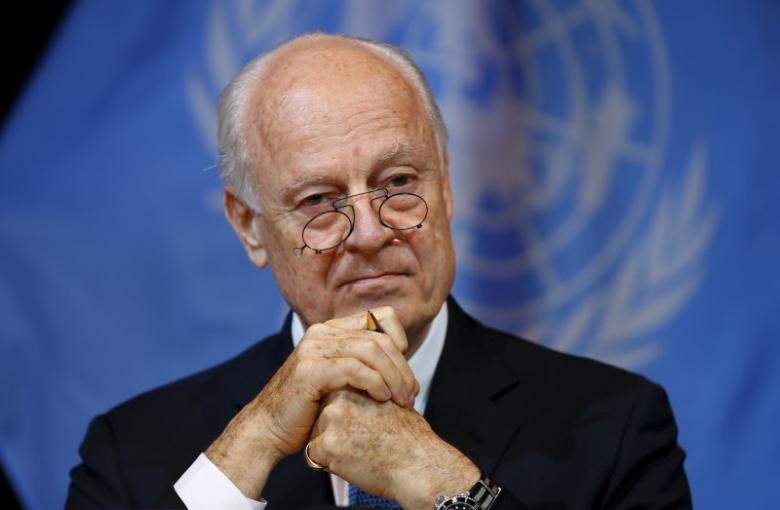London – UN Special Envoy for Syria Staffan de Mistura said that the agreed truce in southwest Syria was a “positive step in the right direction”, noting the presence of common interests between the US and Russia, including fighting ISIS and easing the crisis in the Middle Eastern country.
In an interview with Asharq Al-Awsat newspaper, the envoy hoped an agreement would be reached between the US and Russia over the implementation of UN Security Council Resolution 2254. He said the de-escalation zones were a temporary solution and stressed that partition would not be part of Syria’s future.
De Mistura said, during the phone interview, that the ongoing round of indirect talks in Geneva would achieve “some cumulative progress in understanding some of the preparatory work that needs to be done”.
Asked about the agreed truce in the South between the US and Russia, the UN envoy said: “Ceasefire is always good news for the Syrian people; after six years of war, I can sadly tell you that unfortunately around 400,000 people have been perhaps killed. The first thing the Syrian people ask for is a ceasefire.”
He added that the agreement, which was achieved by Presidents Donald Trump and Vladimir Putin in southwest Syria, “is a positive step in the right direction.”
“It came following a series of meetings in Amman and Astana,” he noted.
As for the mechanism to monitor the good implementation of the truce, De Mistura said that talks were ongoing in Amman on how to achieve an effective monitoring mechanism.
“We have learned that ceasefire does not last because of the goodwill of the parties, but is sustained by a good monitoring mechanism that prevents problems from becoming irreversible,” he stated.
“Another point is that we must keep in mind that this truce is temporary. This is why it has been called a temporary de-escalation zone, and that the principle of Syrian unity should not be affected or threatened by this step,” the envoy added.
De Mistura told the interviewer that he was well aware of the Syrian people’s fears over partition in the wake of the establishment of de-escalation zones.
“But I want the Syrians to know that the United Nations and the international community are determined that these temporary areas would not be part of Syria’s future,” he stated.
The international envoy noted the presence of common interests between the US and Russia, including defeating ISIS terrorist group and easing tensions in Syria, in order to promote the region’s stability.
He said he hoped both sides would agree on a mechanism to implement UN Security Council Resolution 2254 through a political process in Geneva.
Asked about the ongoing indirect talks in Geneva, and whether it would end in the unification of the opposition factions, De Mistura said: “We are not seeking to have a unified opposition, because this might take a long time; instead, we want the opposition to have a unified stance over key issues, such as the constitution, the elections, governance and fighting terrorism.”
On whether he was optimistic over the current round of talks, the international envoy said: “I am realistic. Perhaps this specific week of negotiations will make some cumulative progress in understanding some of the preparatory work that needs to be done.”
Only through strenuous efforts and hard work that positive result could be achieved, he added.
